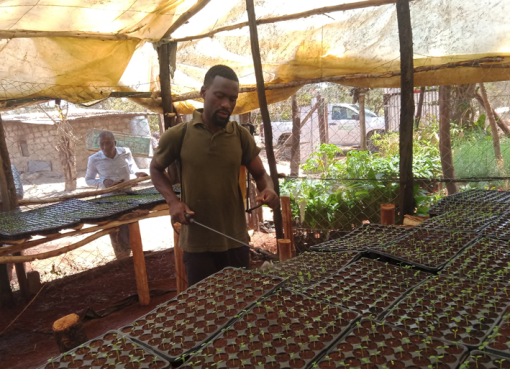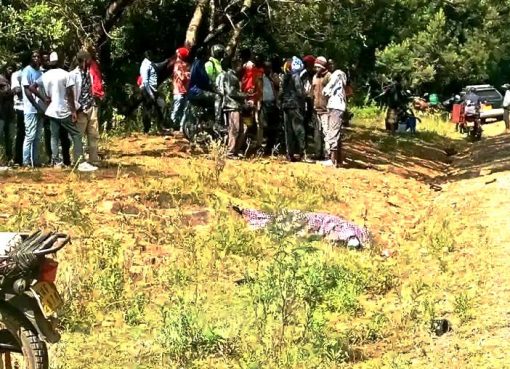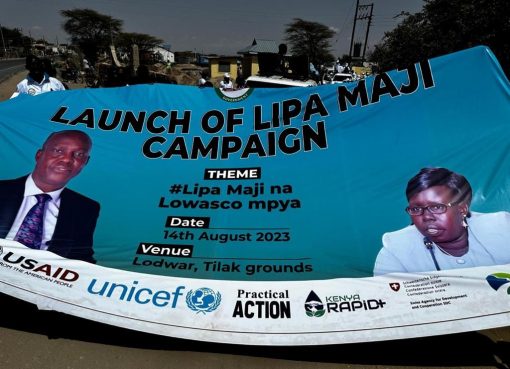The County Government of Uasin Gishu has partnered with the Netherlands through the International Finance Corporation (IFC) to support farmers in adopting the Warehouse Receipt System (WRS) to increase agricultural productivity, manage post-harvest losses, and increase their income.
The Warehouse Receipt System allows owners of commodities to deposit the commodities in any of the certified warehouses in the country and are issued with a Warehouse Receipt as proof of ownership. They can use the receipt as collateral to access credit facilities from financial institutions.
Speaking during a visit to Uasin Gishu with a delegation from the IFC, a team from the State Department of Trade and Warehouse Receipt System to discuss with farmers the challenges they face, especially on post-harvest losses, the Deputy Head of Mission Embassy of the Kingdom of the Netherlands, Mr Joris Bommel, reiterated the need for strong partnership between the Netherlands, Kenya, and the county to address some of the challenges farmers face in order to boost agricultural production.
“We have reports from the past years that productivity for farmers is increasing, which is good. There are a lot of post-harvest losses, which are a threat to food security and farmers’ income. This is a serious issue in the sector that needs to be addressed,” he said.
The envoy indicated that the Netherlands, together with the IFC, will work closely with the national government, county governments, and private sector to improve the Warehouse Receipt System (WRS) to increase productivity and income for farmers.
“By embracing WRS, we can increase productivity and make sure that the income of farmers also increases. This is key to ensuring food security for the country and the county,” said Mr. Bommel.
He praised the long-standing friendship between his country and Kenya and the already established cordial cooperation in terms of logistics, agriculture, and other sectors such as water, renewable energy, health, and bioscience.
Bommel called for strengthened cooperation at the national and county levels in agriculture, health, logistics, energy, and water.
Uasin Gishu Governor Jonathan Chelilim revealed that they had discussed the county’s partnership with IFC in order to attract and promote private sector investment in agriculture and other sectors.
Noting that agriculture plays a very vital role in the Kenyan economy, Chelilim commended the Warehouse Receipt System Council (WRSC) for developing and implementing the WRS to facilitate structured agricultural commodity trade and help farmers access credit facilities by selling their produce as collateral.
“We are committed as county government to support the WRSC on any initiatives or programmes that are aimed at promoting aggregation and the warehouse receipt system,” said Chelilim.
He acknowledged IFC for supporting the private sector to develop, as he requested the corporation to support WRS in licensing Moi-Soy warehouse and consider funding the same to support the county’s dream of value addition in maize.
The Governor also indicated that they had discussed other areas of collaboration between the county government, the Netherlands, the IFC, and the WRSC, like agricultural research and development, trade, and infrastructure.
“We have explored other areas where the county government would collaborate with the WRSC, IFC, and the Netherlands to promote agricultural development in our county. This includes combined technical assistance to farmers, improved access to credit, promoting value addition, or strengthening the agricultural value chains,” he noted.
He acknowledged the Netherlands support for the county’s development agenda by supporting potato farmers in Ainabkoi Sub County and looking forward to the expansion of the warehouse and the automation of the sorting process and value addition of the potatoes to derive maximum value for the farmers.
Chelilim affirmed his support of the president’s idea on warehouse commodity exchange, adding that his administration had committed Sh 100 million to top up the other Sh 100 million the government had given for the programme.
In her remarks, Lucy Komen from the WRSC said that the council is envisioned to structure agricultural trade so that the farmer is not on the road trying to market the commodity but has access to the market through the WRS and realizes value for their crops.
“We are looking at a space where post-harvest losses are managed, where there is financial inclusivity, especially for women and youth, and where there is an increased market for the commodities,” said Ms. Komen.
The IFC, Netherlands Embassy, and County team visited Soy-Mateng, Moi-Soy milling plant, Kabenes, and Moi’s bridge to exchange ideas on how to improve agricultural productivity.
By Ekuwam Sylvester and Caren Rutto





